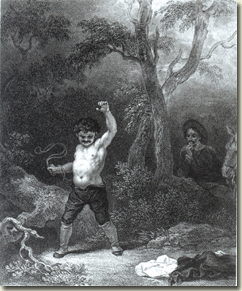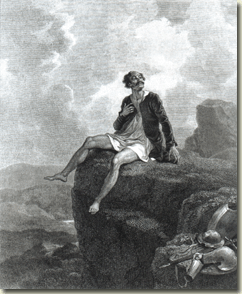| |

Sancho’s Whipping (II.71)
R. Golding, after the
drawing of Robert Smirke (1752 – 1845)

The Penitence of Don Quixote in Sierra Morena (I.25)
Francis Englehart, after the drawing of
Robert Smirke.
In this episode Don Quixote does not act at all "in
a lukewarm and halfhearted way" (Grossman,
697), since to Sancho’s observation on the absence of motives for
such penitence, the knight answers: "Therein
lies the virtue – responded Don Quixote
– and the excellence of my enterprise, for a knight errant
deserves neither glory nor thanks if he goes mad for a reason: the
great achievement is to lose one’s reason for no reason, and to let
my lady know that if I can do this wthout cause, what should I not
do if there were cause?" (English
translation by Edith Grossman, Don Quixote. A New Translation
by Edith Grossman. New York: HarperCollins, 2003, p. 194).
Authors who have written
on topics closely related to this passage from Don Quixote
include:
• Castro, Américo, «Cervantes y la Inquisición»,
in Hacia
Cervantes, Madrid: Taurus, 1967, 213-221.
• Descouzis [1972]: Descouzis, Paul Marcel, «C. y San Pablo, con la
iglesia hemos dado, Sancho (Q., 2.ª P., c. IX)», Anales
Cervantinos, XI (1972), pp. 33-57.
• López Navío, José, «Sobre la frase de la duquesa: “las obras de
caridad hechas floja y tibiamente” (DQ, II, 36)», Anales
Cervantinos, IX (1961-1962), 97-112.
• Márquez, A., «La Inquisición y Cervantes», Anthropos, 98-99
(1989), 56-58.
• Márquez, A.. Literatura e Inquisición en España, Madrid:
Taurus.
• Osterc, Ludovic. El “Quijote”, la Iglesia y la Inquisición,
México: UNAM, 1972.
• Ricard, Robert, «Cervantes et l’Inquisition Portugaise», Les
Lettres Romanes, 17 [2] 1963, 167-170.
• Ricard, Robert, «Sur deux phrases de Cervantes (Don Quichotte,
I, 7 et II, 36)», Les Lettres Romanes, 17 (1963), 159-167.
• Rodríguez Marín, F. «Cervantes y la Inquisición», en su ed. del
Quijote (Madrid, 1928), vol. VII, appendix 31, 333-338. |
| |
In the year in which we
celebrate the fourth centenary of the publication of the first
part of Don Quixote (1605) we believe that this brief
note may help to elucidate a passage that has always raised
questions for critics. The text in question is found in
chapter 36 of the Second Part (1615) and it is one of the few
explicitly expurgated by the Inquisition.
The following day, the
duchess asked Sancho if he had begun the task of the penance he
was obliged to perform in order to disenchant Dulcinea. He said
yes, that very night he had given himself five lashes. The
duchess asked what implement he had used to administer them. He
responded that he had used his hand.
– That –
replied the duchess – is more
like slapping than flogging. It seems to me that the wise Merlin
will not be satisfied with so much gentleness. And that it will
be necessary for our good Sancho to use a whip with metal points
or a cat-o’-nine-tails, something he can feel, because a good
teacher never spares the rod, and the freedom of so great a lady
as Dulcinea cannot be gotten cheaply, and at so little cost; and
be advised, Sancho, that works of charity performed in a
lukewarm and halfhearted way have no merit and are worth
nothing.
(Grossman translation, p. 697)
The problem lies in the
final phrase: "and be advised, Sancho, that works of charity
performed in a lukewarm and halfhearted way have no merit and
are worth nothing". In 1616, the Valencia edition by Patricio
Mey suppressed it suddenly, without an overt prohibition by the
Inquisition until 1632. In that year indeed, in the Índice
expurgatorio of Cardenal Zapata, on page 905, he orders that the
phrase be erased from all editions, but without clarifying why.
Somewhat surprised, Francisco Rodríguez Marín concluded a brief
study entitled "Cervantes y la Inquisición" by confessing:
"no
acierto a explicarme en qué pecó Cervantes para que mandaran
borrar en su libro un concepto que de San Pablo acá viene
corriendo como verdad palmaria" [I am unable to explain what sin
Cervantes may have committed that led to the order of erasing
from his book a concept that was so common from Saint Paul on
that it came to constitute a self-evident truth] (p. 338). Thus,
Rodríguez Marín’s aticle gathered together a series of similar
affirmations from the pen of authors such as Francisco de Osuna,
Bernardino de Laredo, Alonso de Orozco, Jerónimo Gracián, etc.,
that refer to Christian charity, but which had no problems with
inquisitorial censorship. But Rodríguez Marín forces his
argument a bit, since all of these quotes, as he himself notes
in his conclusion, deal principally with charity according to
Saint Paul’s sentence in the First Epistle to the Corinthians
13.3: "et si distribuero in cibos pauperum omnes facultates meas
et si tradidero corpus meum ut ardeam caritatem autem non
habuero nihil mihi prodest" ("And if I give all I possess to the
poor and surrender my body to the flames, but have not love, I
gain nothing"). That is to say, they point out that good deeds
done without the Christian virtue of charity are of no use for
future life, and they do not touch on what appears to us to be
the crux of the affirmation by Cervantes’s duchess: the
condemnation of acting "in a lukewarm and halfhearted way" in
matters of Christian praxis.
We will leave without
comment the question of the irony involved in applying a
theological subtelty to the lashings that Sancho must inflict
upon himself in order to disenchant Dulcinea, even though
Cervantes is surely playing entirely upon it. On this point we
agree with Américo Castro:
No creo que Cervantes tuviera
ninguna intención complicada al escribir la frase que tan
peligrosa juzgó el Santo Oficio; el que se encuentre en el
Quijote está, sin embargo, de acuerdo con el carácter íntimo y
antivulgar del cristianismo de Cervantes, con el hecho de su
predilección por el Apóstol San Pablo y con el abolengo
erasmista de su religiosidad. (Hacia Cervantes, 219)
[I do not believe that
Cervantes had any complicated intention when he wrote this
phrase that the Holy Office adjudged so dangerous; the fact that
it is found in Don Quixote is, nevertheless, in accordance with
the intimate and anti-commonplace nature of Cervantes’s
Christianity, and with his love for the Apostle Saint Paul and
with the Erasmist lineage of his religiousness.]
But neither can Américo
Castro offer any other reason for the prohibition of the phrase
beyond "the distant hint of illuminism rose up before Cardinal
Zapata, and he then took action with a zeal that in 1632 strikes
us as being somewhat retrospective" (218-219). It would be one
more instance of the Catholic reticence in the face of the
interiority of individual conscience, inferior in value to
external and material deeds, which generate an immediate public
consensus. Thus the Inquisition would have seen in this
redundant literalness (like that employed in the famous sonnet
to the tomb of Phillp II in Seville), crafted in a phrase devoid
of any dogmatic loopholes, an irony that it would be best to
eliminate.
And indeed, we can add
that the Sessio VII del of the Council of Trent developed
explicitly as the center of Christian faith the need for action,
affirming that faith without works is invalid, and pure desire
or will that is not acted upon is not sufficient. This point
seems to be a cause for constant reflection by Cervantes. It is
at the heart of the construction of the character of Don
Quixote, of course. But it recurs throughout the work (as well
as in his pastoral romance, La Galatea, III, f. 127). To cite
just one example, in chapter 50 of the First Part. Don Quixote,
caged in a cart, utters a long and beautiful speech on the
excellence of books of chivalry. In his impeded condition, he
winds up lamenting that in his current circumstances he is
unable to put into practice his ideals and good intentions;
although he winds up saying:
I think that with the valor
of my arm, and heaven favoring me, and fortune not opposing me,
in a few days I shall find myself the king of some kingdom where
I can display the gratitude and liberality of my heart. For by
my faith, Señor, the poor man is incapable of displaying the
vittue of liberality with anyone, even if he possesses it to the
greatest degree, and gratitude that consists of nothing more
than desire is a dead thing, as faith without works is dead…
(Grossman, p. 430).
The direct quote from
the second epistle of St. James is clear ("...et
fides sine operibus mortua est" 17
and 26). And the very literalness does not conceal an ironic
seed and an intention that also misma literalidad no oculta un
germen irónico y una intención que también – just as in the
previous example – could have been perceived by the Inquisition.
Especially if, as is pointed out in a note in the edition by
Francisco Rico, the context of Don Quixote’s phrase contradicts
the sentence of the Glossa ordinaria of II Corinthians, IX, 7:
"large dat qui affectum largiendi
habet, et si nihil habeat quod largiri possit"
(cit. Volumen Complementario, 418).
Then, why is it that
the Inquisition took umbrage only with this phrase from Don
Quixote II, 36?
Perhaps we can arrive at the
solution if we keep in mind that Cervantes, familiar with the
Adagia of Erasmus, and surely an avid reader of the Empresas
morales by Juan de Borja (the first part of which, let us not
forget, was published in 1581), recalled the concentrated words
of the latter author, that carry forth the rich tradition that
we have commented in our
Silva
1. We need to refer to this reading in order to fully
appreciate the intuition that we we are expousing here. The
recollection that Cervantes appears to have of Borja’s phrase
("es mucho peor, y de mayor inconveniente, el proceder floja
y tibiamente en lo que se emprende que si del todo se dexasse de
hacer" [it is much worse, and of greater inconvenience, to
proceed in a lukewarm and halfhearted way in that which one
undertakes, than if it is left totally undone]) leads, as we have
seen in the aforementioned Silva, directly to an adage commented
on by Erasmus. In the same sense of the dialectic between will
and action, and the need to undertake actions decisively and
without vacillation. And so readers and censors of refined
sensibilities were able to capture this.
And now a final
question would be: why then, did Borja escape offical
censorship? There does not appear to be an easy answer. The
Empresas morales, a work that was not widely disseminated in
1581, may simply have escaped the notice of the Inquisition in
its first edition, published in Prague, and by 1632 it was
already too late to apply to the book that "retrospective zeal"
of the inquisitor Zapata. And then, in 1681, when the second
edition came out in Brussels, the texts of Erasmus were no
longer subject to such minute quibbles.
In any event, we
believe that the indisputable similarity of enunciation of the
texts of Juan de Borja and of Cervantes, should not escape the
attention of critics of Don Quixote.
|